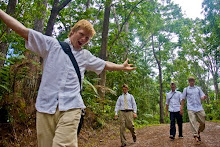1. Why did you go into journalism?
Sports reporting has always appealed to me, but when I got my first part-time job covering high school sports, I immediately fell in love with the business. There’s something about getting to know the players and coaches on a deeper level, while enjoying the atmosphere of sports.
2. How did your break in the field?
I did some work in high school, and so during my freshman year of college, I saw a part-time job published in the local daily St. George newspaper working on the sports desk. I applied, and three months later, they moved me on the desk and started sending me out to cover local events. That experience really helped me when I finally graduated, allowing me to land a copy desk job and eventually move to sports after 10 months on the desk. After two years of working in sports, I moved into a news position as the Bureau Chief in Cedar City for the Spectrum & Daily News, then eventually moved into a supervisor role at BYU.
3. How do you define “good” journalism?
Good journalists are ethical and know that they are the fourth estate. Journalists are professional and understand that their jobs are not to “get” somebody “or bring them down” but rather to inform the public of what it wants and needs to know.
4. Do you feel like your news organization practices “good” journalism?
Yes. I believe that since we’re in education, there are occasions when students cut corners or simply are not far enough along in the process to understand good journalism practices. But I believe the faculty and staff understand good journalism and do their best to train the students in good journalism practices.
5. How would you define the type of journalism you do?
Right now, I work in an education role, training journalists in skills they need to get jobs.
6. Does your organization allow you to do the type of journalism you want to do?
Sometimes I miss getting out of the office and covering games, but I really love mentoring students.
7. How does the journalism you practice serve your community?
This job allows me to share what I’ve learned and help train the next generation of journalists. We also are able to help inform the BYU student of issues that affect them.
8. What is your opinion about recent movements such as community, citizen, civic, and public journalism?
I think it’s great to get the public involved in issues they care about. However, I believe there will always be a need for professional journalists to act as a filter. They know how to act ethically, have been trained to be objective and present all sides of an issue, and understand how best to present the information. However, one thing I think journalists have always struggled with is a “disconnect” from readers. Too often, try to tell the public what it wants, instead of listening to the public’s needs. Involving consumers in journalism is a good way to connect and make sure you are fulfilling your public’s needs, instead of what you perceive to be its needs.
9. Have you ever had an experience in which you felt your work as a journalist really made a difference?
People joke that sports journalism is the “toy section” of the newspaper and that it’s not important. But every time I’ve ever had a reader or a source thank me for a story, I really feel like I reached somebody — even if I didn’t help “bring down” a political administration. I think that type of journalism is important to the people you cover— reaching out to people in the community and sharing their stories with others.
10. How have your views about journalism changed over the years?
I think I have a better understanding of the role of a journalist from the experiences I’ve gained than I did when I was in college.
11. Have you been affected by dropping circulations, ratings, layoffs, and growth of citizen journalism?
Not personally, but I know plenty of people who have.
12. What advice would you give students wanting to go into journalism?
Don’t be afraid to work hard and pay your dues. Make sure that you understand that as a journalist, you serve the public, and not the other way around.
13. What importance do you place on new media and social media in the journalism industry and do you
have any examples that express its importance?
I think it’s the next step in the future of journalism. I believe young readers are more interested in social media because there are so many options out there that you compete for their attention.
14. How do you think BYU’s online newspaper compares to other college online newspapers or local or national online newspapers?
We’re still behind. We are far better than we were a year ago, but we hadn’t updated our Web site in eight years and it showed. In the past year, our multimedia content, the increased convergence with the Daily News TV show and the redesign of the Web site have helped. But if we’re going to prepare students to get jobs as online journalists, we still have a long way to go.
15. What future media ideas or plans do you have for the online Daily Universe?
Right now we’re working on implementing more social media tools: Twitter, Facebook, use of mobile technology to cover stories, cover it live. I see that as our next big step.

No comments:
Post a Comment